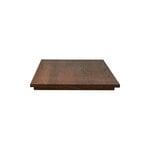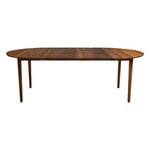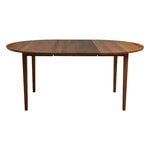This extension plate is designed to fit the Sibast No 3 dining table. The extension leaf makes it possible to adjust the table size according to need. The extension plate measures 120 x 50 cm; you can mount up to two extension plates to the Sibast No 3 dining table to seat even a larger group of people.




No 3 table extension plate, smoked oak
Sibast
Description
This extension plate is designed to fit the Sibast No 3 dining table. The extension leaf makes it possible to adjust the table size according to need. The extension plate measures 120 x 50 cm; you can mount up to two extension plates to the Sibast No 3 dining table to seat even a larger group of people.
Product details (5)
- Colour
- Smoked oak
- Length
- 50 cm
- Width
- 120 cm
- Material
- Solid oak
- Notes
- The product image features the extension plate installed in the middle of the Sibast No 3 table. The table is sold separately.
- Product ID
Designer
Anna and Ditlev Sibast carry forward the legacy of the renowned Danish cabinetmaker and designer Helge Sibast. In 2012, Helge Sibast’s grandson Ditlev and his wife Anna relaunched Sibast Furniture, a traditional Danish furniture brand whose history dates back to 1908. Sibast Furniture’s collections are based on the original designs of Helge Sibast with updated models designed by Anna and Ditlev Sibast. Their high-quality wooden furniture combine Helge Sibast’s distinctive style with modern Scandinavian spirit.
View all productsReviews (0)
Sustainability
The Product Sustainability Framework, our criteria of sustainable design, helps you find the most sustainable products in our selection. Read below which sustainability criteria this product has met.
Working conditions & labour 6/9
-
Equal opportunities for all employees
-
Commitment to UN Global Compact, fair compensation for all employees
-
Corporate responsibility requirements defined and communicated for suppliers
-
Systematic work for improved inclusion and well-being in the workplace
-
Transparent supply chain
-
Compliance to the UN Guiding Principles on Business and Human Rights ensured in the supply chain
-
Suppliers' compliance to a code of conduct ensured
-
Direct suppliers audited and certified
-
Support for community involvement in the supply chain
Eco-friendly production 8/9
-
Fair and resource-wise water-use in production
-
No incineration or landfilling of returned items
-
No use of endangered species as materials
-
No direct environmental emissions or waste (excl. GHGs) from production
-
The sustainability of direct suppliers' production is addressed and monitored
-
Material-efficient and ecological packaging
-
Positive impact on nature’s well-being through operations that regenerate natural ecosystems
-
No potentially harmful chemicals used in own production
-
Production and material sourcing that respect biodiversity, animal rights, and natural ecosystems
Climate impact 4/8
-
Company's direct greenhouse gas emissions identified and commitment to reduction
-
Product's carbon impact identified and commitment to reduction
-
Guidance on energy- and eco-efficient use of the product
-
Carbon neutral or carbon negative product
-
Contribution to climate initiatives beyond the brand’s direct operations
-
Low-carbon or compensated transportation
-
Carbon footprint of the product calculated and goals set to reduce it
-
100 % renewable energy in own production and operations
Sustainable materials 6/6
-
Sustainable and long-lasting material choices
-
No harmful or hazardous substances
-
Responsible raw material sourcing and production
-
Materials suited for circularity: monomaterials, recyclable finishings, renewable or recycled contents etc.
-
Ecological materials: natural, biodegradable, recyclable or recycled contents
-
Outstanding materials in terms of innovativeness, responsibility, sustainability and circularity: local production or sourcing, 100 % recycled content, C2C-certification etc.
Circular design 4/5
-
High aesthetic quality promoting long-term use of the product
-
Technically durable product design and material choices
-
Design for enduring life-long quality
-
Design and support for product maintenance, repair and upgradability
-
Innovative circular design solutions: circular service system, resale platform, remanufacturing, collection of used products, etc.






